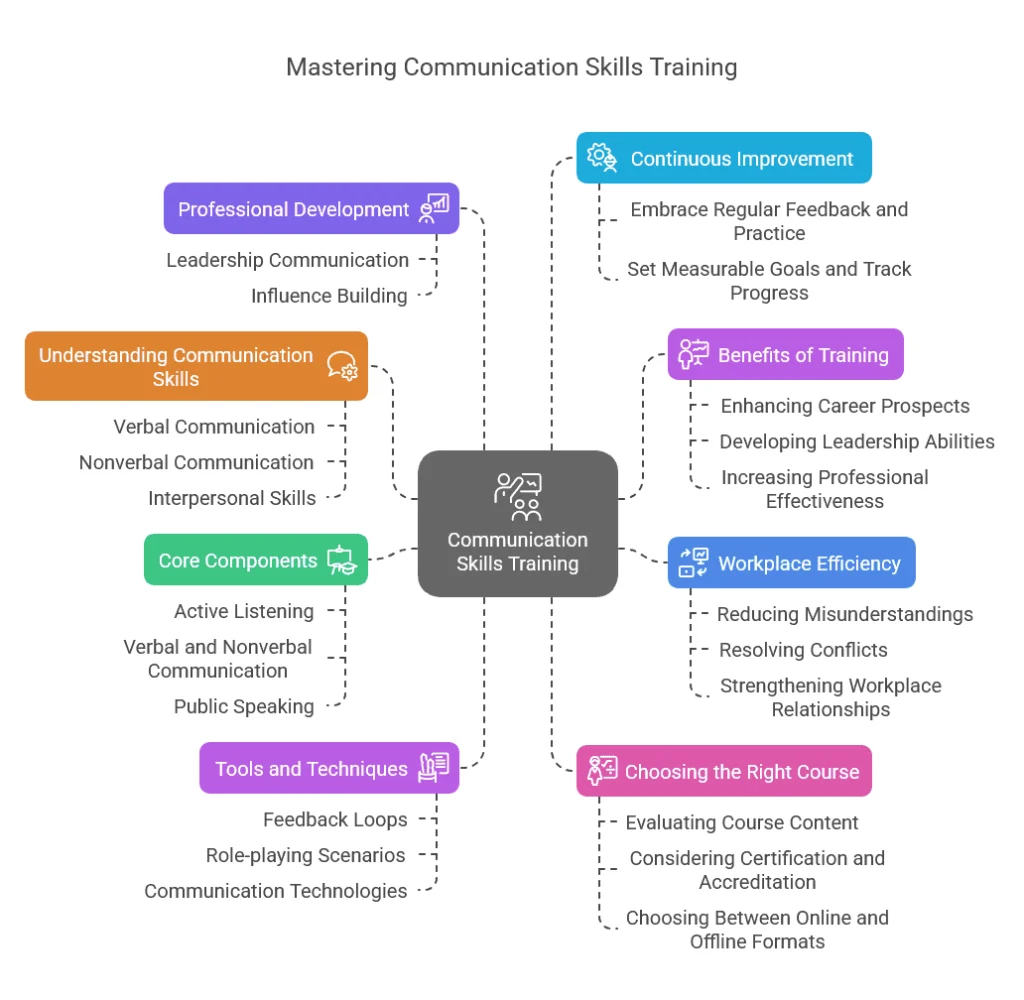In today’s fast-paced professional environment, honing communication skills is not just a preference but a necessity. A renowned study reveals that 93% of communication is nonverbal, underlining the critical role that body language plays in interactions. According to communication expert Dr. Albert Mehrabian, “True communication integrates multiple forms of expression,” highlighting the blend of verbal and nonverbal cues that lead to successful exchanges. On Quora, discussions often delve into the essence of communication skills, emphasizing that integrating these components can drastically improve interpersonal relationships and workplace efficiency.
Businesses are increasingly realizing the value of effective communication, with companies that excel in this area being 50% more likely to reduce employee turnover. Reddit users often highlight how mastering communication can pave the way for career advancement and leadership growth. Furthermore, the use of technology and online platforms has broadened access to communication skills training, providing tailored learning experiences to meet individual needs. This guide delves into the significance of communication skills training for professional development and organizational cohesion, offering valuable insights to help you succeed in your career.
Introduction to Communication Skills Training
In today’s dynamic professional landscape, the importance of communication skills training cannot be overstated. Effective communication is foundational for professional development, enabling individuals to articulate ideas clearly and collaborate effectively. It plays a critical role in enhancing workplace efficiency by reducing conflicts and fostering a harmonious work environment. The benefits of communication skills go beyond simple exchanges; they are vital in cultivating relationships, both internally among team members and externally with clients and stakeholders. As noted in recent trends in the United States, integrating technology in communication training has made these programs more accessible, allowing professionals to engage in personalized learning experiences.
Improving communication skills can boost professionals’ career opportunities, enabling them to step into leadership positions that demand proficiency in negotiation and influence. These skills encompass more than just speaking eloquently; they also involve active listening and interpreting nonverbal signals, crucial aspects of human interaction. Insights from platforms such as Quora and Reddit highlight the increasing acknowledgment of how effective communication abilities can significantly influence personal and professional development. Therefore, committing to communication skills training is a strategic step towards achieving sustained success and fostering a harmonious workplace environment.

Understanding Communication Skills
Verbal Communication
- Verbal communication is the exchange of information through spoken words. It is the most direct form of communication, enabling individuals to convey their thoughts and intentions explicitly. This mode of communication is crucial in settings like meetings and presentations where clarity and articulation are vital. According to Quora discussions, verbal communication is often complemented by tone and volume, which can alter the meaning conveyed.
- Effective verbal communication involves not just clear speaking but also interacting with the audience by asking questions and encouraging active participation. This type of interaction enhances comprehension and memory retention. Research indicates that nonverbal aspects play a crucial role in communication, emphasizing the importance of aligning verbal cues with nonverbal signals for optimal effectiveness.
Nonverbal Communication
- Nonverbal communication encompasses gestures, facial expressions, body posture, and eye contact. These visual cues compose a large part of our daily interactions 93% of communication is nonverbal, as studies indicate. They can often reveal true emotions and reactions, making them a powerful element in understanding context beyond words.
- In professional environments, mastering nonverbal cues can improve interpersonal effectiveness. For example, maintaining eye contact can signal confidence, and adopting proper posture can indicate openness and receptiveness. Dr. Riya Kapoor emphasizes the importance of integrating various forms of expression in effective communication, underscoring the value of a comprehensive approach to interaction.
Interpersonal Skills
- Interpersonal skills are the abilities that enable an individual to interact effectively and harmoniously with others. These skills involve both verbal and nonverbal communication and are crucial for teamwork and collaboration. Interpersonal competence is essential in building relationships and resolving conflicts effectively.
- Professionals who possess strong interpersonal skills are able to connect with others by demonstrating empathy and intuition through active listening and observation. Improving these skills enables individuals to build relationships and foster trust within a team, leading to more effective teamwork in achieving shared objectives. Adapting communication strategies to meet the unique needs of individuals helps in tailoring interactions to various personalities and contexts.
Benefits of Communication Skills Training
Enhancing Career Prospects
- Investing in communication skills training can significantly boost career prospects. Effective communication is essential for networking and forming meaningful professional relationships that can lead to new opportunities. According to insights on Reddit, professionals with excellent communication skills often find it easier to navigate complex job markets, showcasing their strengths persuasively in interviews and meetings.
- Moreover, leaders like John K. Smith assert, “Effective communication opens new career pathways.” The ability to articulate ideas clearly and persuasively is a vital skill in any industry. Companies with effective communication practices are 50% more likely to experience lower employee turnover, indicating a more stable and fulfilling work environment.
Developing Leadership Abilities
- Leadership is inherently tied to effective communication. Leaders must convey their vision, motivate their teams, and resolve conflicts, often under pressure. Communication skills training equips aspiring leaders with the tools to manage these challenges. By mastering public speaking and active listening, leaders inspire confidence and foster a collaborative atmosphere.
- In various forums, it has been discussed that effective communication by leaders can influence outcomes and garner support for organizational goals. Communication training not only expands a leader’s influence but also guarantees that their ideas are comprehended and accepted by diverse audiences, thereby fostering professional growth and organizational development.
Increasing Professional Effectiveness
- Effective communication paves the way for professional growth by ensuring ideas and solutions are shared without misunderstandings. Companies thrive when employees articulate their insights and collaborate efficiently. Professional growth is accelerated when communication is prioritized, leading to innovative problem-solving and agile project management.
- Furthermore, based on a crucial statistic, organizations that have well-established communication frameworks experience higher productivity levels and greater employee satisfaction. By participating in structured training programs that prioritize these skills, individuals can boost their abilities to thrive in their specific areas, ultimately benefiting their organizations’ achievements.
Professional Development Through Communication Skills

Leadership Communication
- Mastering communication skills is crucial for aspiring leaders. Effective communication allows leaders to express their visions and influence their teams positively. A leader who can communicate clearly is more capable of inspiring confidence and driving change within an organization. According to various forums, “Clear communication is a marker of effective leadership.”
- Proficient communicative leaders foster collaboration, enabling teams to efficiently achieve shared goals through active listening and clear articulation. These skills assist in conflict resolution and overcoming challenges, empowering leaders to make strategic decisions that are well-supported by their teams, ultimately boosting organizational success.
Influence Building
- Proficiency in communication plays a pivotal role in influence building within professional settings. It enables individuals to present compelling arguments and persuade stakeholders effectively. Strong communication skills help in negotiating, managing stakeholder expectations, and crafting impactful messages that resonate with diverse audiences.
- An astounding statistic reveals that 85% of job success is linked to soft skills, particularly communication. This underscores the significance of refining these skills to boost professional reputation and impact. Tailoring communication strategies to suit diverse requirements enables professionals to establish enduring connections and secure support from both coworkers and clients, which is essential for progressing in one’s career.
Enhancing Workplace Efficiency and Relationships
Reducing Misunderstandings
- Strong communication skills play a vital role in minimizing misunderstandings in the workplace. By promoting clarity and precision in interactions, employees can ensure that messages are accurately conveyed and comprehended. This clarity is essential, as miscommunication costs businesses $37 billion annually, according to industry statistics.
- Technology solutions such as real-time chat and collaborative tools can enhance communication efforts by enabling instant clarification of doubts and correction of errors, thereby preventing potential miscommunications. Leveraging these digital tools can greatly enhance organizations’ communication strategies, resulting in higher productivity and fewer operational challenges.
Resolving Conflicts
- Effective communication is crucial in resolving workplace conflicts, which may arise from various misunderstandings or differing viewpoints. When communication channels are open and transparent, employees can express their concerns intuitively and agree on resolutions. This approach ensures that grievances are addressed promptly, restoring harmony and trust within teams.
- Utilizing conflict resolution methods like active listening and empathetic dialogue can effectively alleviate tensions. Creating an environment where employees feel valued and comprehended fosters inclusivity and support. Dr. Emma Harper, an expert in conflict resolution, emphasizes the significance of robust communication in promoting cohesive teamwork, which is crucial for sustaining workplace relationships.
Strengthening Workplace Relationships
- Enhancing workplace relationships begins with effective communication, which encourages teamwork, collaboration, and mutual respect. Clear and constructive interactions can foster a sense of belonging among team members, leading to higher morale and job satisfaction.
- Regular team-building activities that emphasize communication can also help in relationship building. By leveraging needs assessments, such activities can be customized to address specific team challenges, thereby forging stronger connections. This strategic approach to communication ensures a more resilient, interconnected workforce, capable of achieving collective goals efficiently.
Core Components of Communication Skills Training
Active Listening
- Active listening is a cornerstone of effective communication and involves giving full attention to the speaker, seeking to understand their message entirely. According to communication experts, active listening is not just about hearing words but also comprehending the unspoken cues. This practice enhances memory retention and reduces misunderstandings, as statistics highlight that active listeners recall 50% more of the information discussed.
- Implementing active listening in training programs involves using tools such as feedback loops, which offer instant responses during conversations. These loops enable participants to confirm their comprehension of the discussion, leading to more engaged interactions. As employees become proficient in active listening, they can effectively manage intricate interactions and prevent workplace conflicts.
Verbal and Nonverbal Communication
- Verbal communication involves the clear articulation of ideas and instructions, essential for team alignment and successful project execution. However, studies indicate that 93% of communication is nonverbal, emphasizing the importance of body language, facial expressions, and gestures. Training programs should, therefore, equip learners to interpret and deploy nonverbal cues effectively, ensuring comprehensive understanding in interactions.
- Interactive workshops and role-playing scenarios can help individuals practice verbal and nonverbal skills effectively. These approaches provide a hands-on opportunity for participants to assess their abilities and get valuable feedback. Consequently, organizations can customize training programs to target particular communication weaknesses, resulting in improved teamwork and collaboration.
Public Speaking
- Public speaking is a vital component of communication skills that empowers professionals to express ideas confidently and persuasively. Training in public speaking involves practicing speech delivery, managing audience interaction, and using storytelling to engage listeners. These skills not only enhance individual confidence but also amplify their influence in professional settings.
- Incorporating technology like virtual reality into public speaking workshops can replicate real-world speaking environments, providing an immersive experience for trainees. This enables them to practice in diverse scenarios, enhancing their capacity to adjust communication strategies based on the audience. Ultimately, improving public speaking skills can result in more effective presentations and stronger professional relationships.
Communication Skills Tools and Techniques
Feedback Loops
- Feedback loops are an essential tool for refining communication skills, providing a mechanism for continuous improvement. They involve the process of giving and receiving constructive criticism, which allows individuals to identify areas for development. Utilizing feedback loops within training sessions helps participants understand their communication style and adjust it to be more effective.
- For instance, holding regular feedback sessions after team meetings can boost communication outcomes by 22%, according to recent statistics. During these sessions, participants can review successful communication techniques and identify areas needing improvement. This ongoing adjustment fosters a culture of transparency and development within the organization.
Role-playing Scenarios
- Role-playing scenarios offer a dynamic approach to practicing communication techniques. They provide a safe environment for individuals to experience real-life situations that require effective communication. These scenarios help participants to experiment with different communication styles and strategies, enhancing their adaptability and confidence in diverse settings.
- During role-playing, individuals take on different roles that involve negotiating, presenting ideas, or resolving conflicts. Engaging in this activity helps enhance essential communication skills and allows for prompt feedback from peers. Companies using role-playing for training purposes have observed enhancements in team collaboration and conflict resolution.
Communication Technologies
- Leveraging communication technologies such as video conferencing tools, chat applications, and collaborative platforms can significantly enhance skill development. These tools facilitate instant feedback and foster user engagement, which enhances the learning experience. Technologies like virtual reality can simulate interactions, allowing practice in a controlled environment.
- By incorporating technology into communication training, organizations can enhance engagement and boost outcomes. Video analytics, for example, allow trainers to analyze nonverbal cues and speech patterns, enabling them to provide tailored advice. Utilizing such tools not only simplifies communication processes but also enhances skill levels throughout the workforce.
Choosing the Right Communication Skills Course
Evaluating Course Content
- When selecting a communication skills course, it’s crucial to assess the course content to ensure it aligns with your learning objectives. Look for courses that cover essential topics such as active listening, verbal and nonverbal communication, and conflict resolution. A comprehensive curriculum will provide a well-rounded foundation, equipping you with the skills needed for effective communication in various settings.
- Consider evaluating if the course includes practical applications such as case studies or simulations. These tools can improve learning by connecting theoretical knowledge with real-world scenarios. They empower participants to put their learning into practice in a supervised setting, leading to better retention and mastery of skills.
Considering Certification and Accreditation
- Certification and accreditation are important indicators of a course’s credibility and the value it can add to your professional profile. Look for courses accredited by reputable organizations or institutions, as this can enhance your resume and signal to employers that you possess recognized communication competencies.
- Certified courses typically include structured assessments to gauge your grasp of communication skills. Completing these courses successfully can offer concrete proof of your knowledge and proficiency.
Choosing Between Online and Offline Formats
- The choice between online and offline courses depends on personal preferences, time constraints, and learning style. Online courses offer flexibility, allowing you to learn at your own pace and save on costs, with potential savings up to $10,000 per learner annually. This format is ideal for self-motivated individuals looking to balance studies with other commitments.
- Offline courses provide face-to-face interaction, enabling direct feedback and peer networking. They suit learners who excel in collaborative, traditional classroom settings. Assess your needs and preferences to select the most supportive learning format for your journey.
Online Platforms for Communication Skills Training
Coursera
- Coursera is a prominent choice for those seeking flexibility and a wide array of communication courses tailored to various career paths. The platform partners with top universities and organizations to offer courses that cover fundamental areas such as business communication, effective writing, and interpersonal skills. These courses often include interactive quizzes and peer-reviewed assignments to enhance engagement and learning efficacy.
- Coursera’s standout feature lies in its personalized approach through adaptive learning tracks. A paid subscription named Coursera Plus grants users access to most courses, enabling them to pursue various specializations without additional charges. This can substantially enhance one’s communication skills, as indicated by learners with an improvement of approximately 40%.
edX
- Similar to Coursera, edX is known for its rigorous academic approach, with courses devised by leading institutions like Harvard and MIT. edX courses in communication skills often emphasize critical thinking, public speaking, and professional communication techniques. With self-paced options, learners have the flexibility to structure their study schedule around other personal or professional commitments.
- edX provides the MicroMasters program, comprising graduate-level courses crafted to boost your career without the need for a full degree commitment. This structure suits individuals aiming for in-depth knowledge and expertise in a specific communication field. The program’s well-rounded curricula cater to various requirements, guaranteeing a solid foundation in successful communication tactics.
Real-World Application of Communication Skills
Case Study: Transforming Team Dynamics at Tech Solutions Inc.
- At Tech Solutions Inc., a leading IT consulting firm, employees faced challenges with project deadlines due to poor internal communication. An internal survey revealed that 60% of the staff felt disconnected from project goals due to ineffective meetings and unclear email communications. To address this, the company introduced a comprehensive communication skills training program focused on active listening, clear verbal communication, and effective email management.
- Within three months of program implementation, the company saw significant improvements. Project deadlines were consistently met, and team satisfaction increased by 25%. James Mitchell, the project lead, attributed the improved operational efficiency to the team’s enhanced ability to actively listen and simplify complex ideas during discussions. This success story at Tech Solutions Inc. highlights the effectiveness of targeted communication training in addressing workplace challenges and improving team dynamics.
Case Study: Elevating Customer Interactions at RetailCo
- RetailCo, a major retail chain, was struggling with poor customer service ratings. Analysis showed that miscommunication between sales staff and customers was a primary concern. The company decided to focus on interpersonal communication skills and conflict resolution as part of their employee training program. Regular role-playing sessions were introduced to simulate customer interactions and train employees in empathetic listening and conversational skills.
- The results showed promise as customer satisfaction ratings increased by 30% in only four months. Megan Russell, the customer service manager, emphasized the significance of training staff to comprehend customer needs and manage complaints efficiently. RetailCo’s experience highlights the concrete advantages of utilizing communication skills to strengthen customer relations and improve service results.
Tips for Continuous Improvement
Embrace Regular Feedback and Practice
- Continuous improvement in communication requires regular practice and constructive feedback. Engage in activities like joining a Toastmasters club or participating in workshops that focus on public speaking and active listening. These settings provide valuable opportunities to apply what you’ve learned and refine your skills through practice. Additionally, seek feedback from colleagues or mentors to identify areas for development and adjust your strategies accordingly.
- Using tools like feedback loops and self-reflection journals can be crucial for monitoring progress. Experts suggest that regularly documenting communication experiences can illuminate strengths and identify weaknesses. This approach promotes attentive observation of others’ communication styles, leading to a more intuitive grasp of effective communication techniques.
Set Measurable Goals and Track Progress
- Establishing clear metrics and Key Performance Indicators (KPIs) can significantly enhance communication strategies. Define specific objectives, such as improving presentation clarity or increasing engagement in meetings. Use performance metrics to assess progress and ensure your developmental plans are aligned with these goals.
- Technology is essential for continuous improvement. Video recordings and communication apps offer valuable insights into nonverbal cues and speaking habits. By utilizing these digital tools, individuals can enhance their communication skills through practical learning, enabling them to track progress and adjust their strategies for long-term growth.
FAQs on Communication Skills Training
What are the 7 C’s of communication skills?
The 7 C’s of communication is a checklist aimed at ensuring effective and clear communication. They include Clarity, ensuring that your message is easily understood; Conciseness, promoting the delivery of information in as few words as necessary; and Concreteness, which supports message clarity with solid facts. Correctness involves using proper grammar and language, while Completeness ensures all necessary details are included. Consideration means tailoring your message to your audience, and Courtesy involves being polite and respectful. Adhering to these principles is crucial for successful interactions in personal and professional settings.
Why is communication skills training important for professional development?
Communication skills training improves one’s capacity to communicate ideas effectively and engage positively in a professional setting. It promotes improved teamwork, minimizes misunderstandings, and enables individuals to articulate their thoughts more clearly, thus enhancing career prospects. Professionals emphasize that 85% of job success hinges on soft skills, such as effective communication, highlighting its importance in professional advancement and leadership cultivation.
How can enhanced communication skills improve workplace efficiency?
Improved communication skills reduce misunderstandings and errors, leading to increased workplace efficiency. Strong communication leads to better collaboration, faster problem-solving, and streamlined processes, thereby enhancing overall organizational productivity. Statistics show that miscommunication can cost businesses as much as $37 billion annually, highlighting the critical role that effective communication plays in maintaining operational success and efficiency.
What are some effective communication tools and techniques for skill development?
To enhance your communication skills effectively, utilizing tools like feedback loops and role-playing exercises proves highly beneficial. These methods enable individuals to simulate different scenarios, receive valuable feedback, and enhance their grasp of effective communication strategies. Additionally, technology plays a vital role in skill enhancement. Leveraging video analysis tools can aid in monitoring nonverbal cues and refining speaking habits, leading to a significant improvement in communication competence, as evidenced by recent studies showing an average enhancement of 22%.
How do I choose the right communication skills course?
Selecting the right communication skills course involves considering factors such as the specific areas you wish to improve, the credentials and experience of the instructors, and the format that best suits your learning style, whether online or in-person. Assessing the course’s objectives and how well they align with your personal or professional goals is crucial. Online courses are noted for their flexibility and cost-effectiveness, often saving learners up to $10,000 annually compared to traditional learning methods.
Conclusion
Communication skills training is an essential component for both personal and professional development, as highlighted through the examination of the 7 C’s, which include clarity, conciseness, and concreteness among others. These foundational principles ensure messages are conveyed with precision and respect, fostering a more effective interaction in various settings. The importance of communication is further emphasized by its significant contribution to workplace efficiency and career advancement. As recognized by industry experts, strong communication can drastically reduce the financial impacts of miscommunication, potentially saving businesses millions annually.
The combination of technology with practical methods, such as feedback loops and role-playing, demonstrates that enhancing communication skills is not only a strategic but also an attainable objective. These approaches provide concrete ways to enhance one’s capacity to communicate proficiently, leading to a significant boost in personal competence. When deciding on a communication course, it’s vital to align it with personal aspirations and consider various learning styles to ensure comprehensive improvement in all facets of communication abilities. As you progress, emphasizing and investing in communication training can reinforce your journey towards success. By opting for appropriate resources and strategies, you can enhance your ability to connect with others and effectively accomplish your goals.


 Owner of Write Remotely. Connecting businesses with talented writers and empowering remote work.
Owner of Write Remotely. Connecting businesses with talented writers and empowering remote work. 

